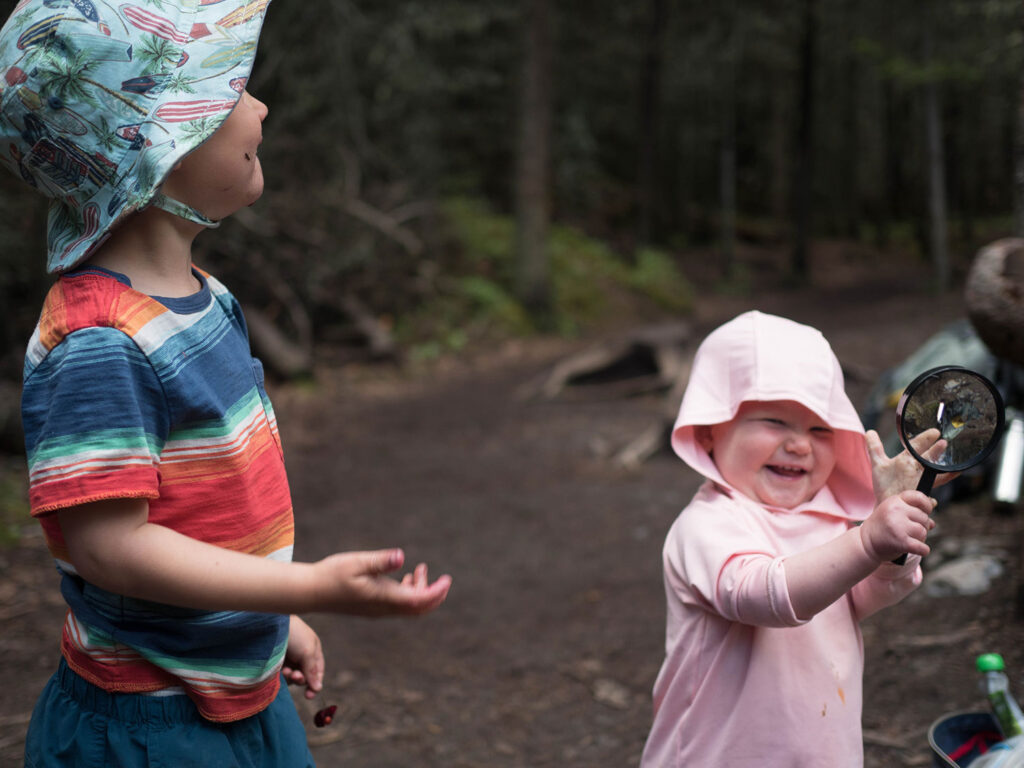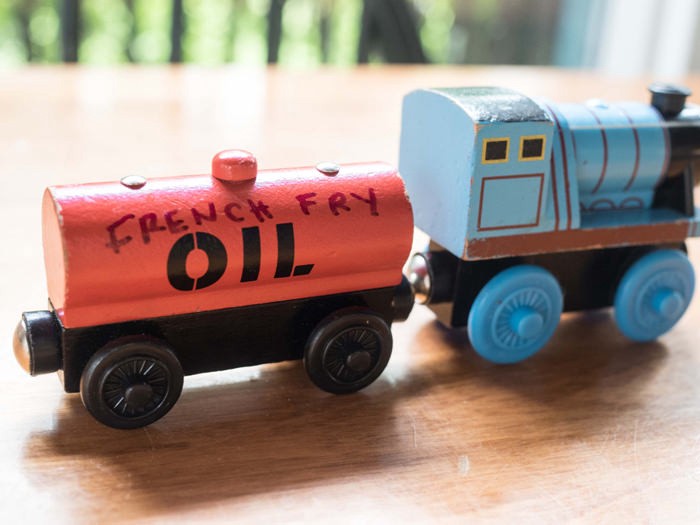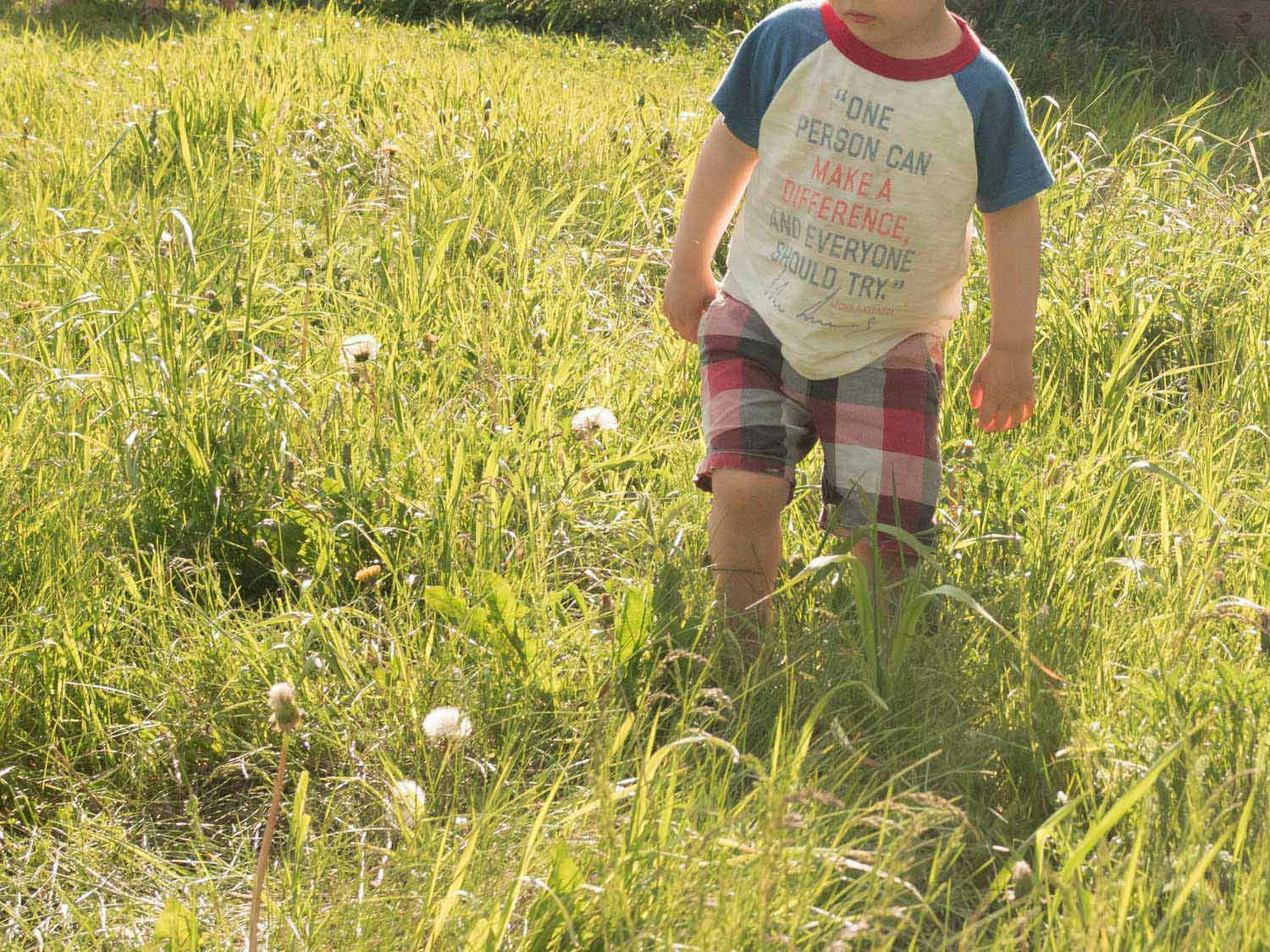Black Sheep Parenting for a Greener Future
Gus’ newest columnist embraces the paradox of sustainable parenting.
The author’s 3-year-old, alias Little Grey Lamb
I’d really rather not write this column. I just put my 16-month-old daughter down for a nap, and ninja-stealthed out of her room to click away at this keyboard. But I’d rather be back there cuddling. I’d also rather hide my head in the sand, and go about my days as if nothing was wrong. But…
IT’S. ALL. WRONG.
Alright, maybe that’s a bit of a pessimistic opener, but I’m finding it hard to resist the doom and gloom lately. As I write, immigrant children sit in cages the US, with no idea if they’ll ever see their families again. One football field’s worth of forest was lost every second last year (let that sink in). Politicians waste time debating the exact degree humans contribute to climate change, while scientists calculate the number of years we have left before Earth can no longer sustain life.
When I say I’d rather not write this column, I should also say I really am excited about sharing my thoughts with a broader audience. I’m stoked to introduce you to my kids — Mini Ewe (the 16-month-old) and Little Grey Lamb (3 and a half) — and my husband, Eric. (At 33, he no longer gets a cute pseudonym, though I think it would be funny to call him Old Ram.) But writing this column also means I have to look the tough stuff in the face every damn day.

So much is wrong, but it doesn’t have to swallow us whole. And in fact, it can’t. As the future draws closer, my family needs me to walk with them into the bleakness, and help them find their capacity to deal with it. Some days, I feel suffocated by the cognitive dissonance involved in preparing Mini Ewe and Little Grey for a disheartening future I wish I didn’t have to think about.
Living consciously makes us aware of the contradictions our world is steeped in. In This Changes Everything, Naomi Klein writes:
Living with this kind of cognitive dissonance is simply part of being alive in this jarring moment in history, when a crisis we have been studiously ignoring is hitting us in the face — and yet we are doubling down on the stuff that is causing the crisis in the first place.
But what if we used that power of cognitive dissonance for good, not evil? Instead of seeing danger and looking the other way, what if we saw the challenge, understood it would be tough to rise to, and resisted the urge to ignore it?
What if we used that power of cognitive dissonance for good, not evil?
Parenting prepares us pretty well for paradox. Nothing makes sense, and yet it has to, on a daily basis. My three-year-old son, Little Grey Lamb, routinely requests that I put his socks on without touching his feet. Mini Ewe likes to simultaneously breastfeed and perform a gymnastics routine (ouch!). My husband and I can spend all weekend together, but — amidst the chaos of pancakes, sippy cups, car rides, and bedtimes — still feel at the end like we haven’t connected at all.
We all have similar dilemmas to reckon with, kids or no kids. So many of us are connected 24/7 by social media and the internet, yet loneliness is epidemic. Our environmental protest signs are compromised by the gas-powered vehicles we drive to rallies. These mind games can help prepare us for the paradoxes of our time: How do we focus on the big picture, but also keep our families happy and healthy?
Let’s not get forget the central paradox any sustainability-minded parent must wrestle with: we brought another human being onto an already crowded planet, and can only hope their positive contributions outweigh the negatives of overpopulation and overconsumption.
My generation is watching our kids grow up into a future in which global warming-induced hyperthermia will be a leading cause of death, much of the planet will experience permanent drought, and our air will become unbreathable: all this potentially as soon as 2040. Our children may not have the luxury of debating whether they should bring babies into the world; it could just be too horrible to do so.
Our children may not have the luxury of debating whether they should bring babies into the world.
When these thoughts plunge me into grief, I find it helpful to heed the words of my somewhat secular saint of ecology, Joanna Macy (speaking on an episode of Podship: Earth):
We have to go through our grief for our world, because it holds a great treasure… Our grief for the world is just one side of the coin. And on the other side, is… love. You mourn what you love.
Love brings our children into the world, and we must harness it to grow them into creatures capable of facing the future with all the courage of storybook heroes. To borrow another image from Macy:
In all great adventures there comes a time when the little band of heroes feels totally outnumbered and bleak, like Frodo in Lord of the Rings or Pilgrim in Pilgrim’s Progress. You learn to say “It looks bleak. Big deal, it looks bleak.”
And so, I write. I’ve styled myself as the “Black Sheep Parent,” because my sustainable parenting choices are unlikely to win me any popularity contests. Over the last couple of sleep-deprived years, Eric and I have given ourselves a pass on some of the harder life choices we’d thought of making (Operation Replace the Grass with Food is still in the planning stages…). But the planet doesn’t care how many hours of sleep we got last night. So we need to focus on shepherding our little ones into the future with awareness, integrity, and compassion. Here are three of our strategies:
Tell the truth without traumatizing
I put the idea of an infinitely resilient planet right beside Santa, the Easter Bunny, and the Tooth Fairy; to avoid disappointment and confusion, we are gently making our children aware that they’re myths. But they exist for a reason: children need magic. Mary Poppins knew where it was at with that spoonful of sugar — but it was sugar, not anaesthetic. Feeding our kids the myth that the “3 Rs” will guarantee a forever-green Earth does a disservice to them and the planet; they need to understand the fragility of our environment in order to work to preserve it.
Eric and I aspire to tell these difficult truths without traumatizing. Little Grey knows oil won’t last forever and is hurting our Earth; when I talk to him, I don’t assume he’ll choose to have children. I try to be developmentally appropriate, so these discussions will change over time and get harder. Whatever the conversation, this black sheep family won’t be wearing rose-coloured glasses: the world as it is provides enough beauty, and we need to see clearly. [Author’s note: for an update on speaking to kids about climate change (or not), see my October 2018 column.]

Romance is more than love notes
Eric and I know how easy it is to forget little romantic gestures in a long-term relationship. But we commit to these displays of caring, because it keeps our connection on days when we feel like ships passing in the night, and shows the kids a loving partnership. I see all our small acts of sustainability the same way: seeking out second-hand clothing and toys, using cloth shopping bags, gardening with rain water.
We need our kids to see that we’re in a lifelong romance with the planet.
But just as relationships cannot subsist on chocolate and flowers alone, these practices will not save the Earth. We need our kids to see that we’re in a lifelong romance with the planet; these small actions are our “love notes.” They don’t replace the big work, but neither can we do without them. They’re the daily reminders of how precious this relationship is.
Nurtured children nurture the planet
In the words of developmentalist Deborah MacNamara, “Children are not meant to work for love. They are meant to rest in someone’s care so that they can play and grow.” I believe children who are nurtured in this way will also be more likely to nurture the Earth. We’re a fairly crunchy, attachment-parenting family (though more Neufeld than Sears, if that means anything to you). No sleep-training, minimal screen time, no separation-based discipline.
We base our parenting on the knowledge that a child with strong early attachment bonds will be more resilient, more likely to succeed, more secure in themselves, and more independent. There’s even research that says children are smarter the more they’re held. All this is intimately related to how well our kids will fare in an uncomfortable future, in which compassion for others will be more crucial, but harder to come by. In that world, they will need the gritty resilience of Frodo, Katniss, and Pilgrim, but also the softness necessary to love a crumbling world.
To be a pessimist in this era of disappearing habitat, vanishing species, bleaching coral reefs, and a rapidly warming climate is the obvious, but useless, choice. To be an optimist is naive at best. I want to embrace the paradox of moving forward with resolve into a world I hoped would never come. I want to treasure the tiny miracles of my children’s lives, while keeping an eye on the darkening sky. I want to teach my children to say, “big deal” to that darkness as they walk onwards into their future.
On that note, you’ll excuse me if I leave you before Mini Ewe’s nap ends. I want to sneak some cuddles before she wakes up.
~ The Black Sheep Parent
